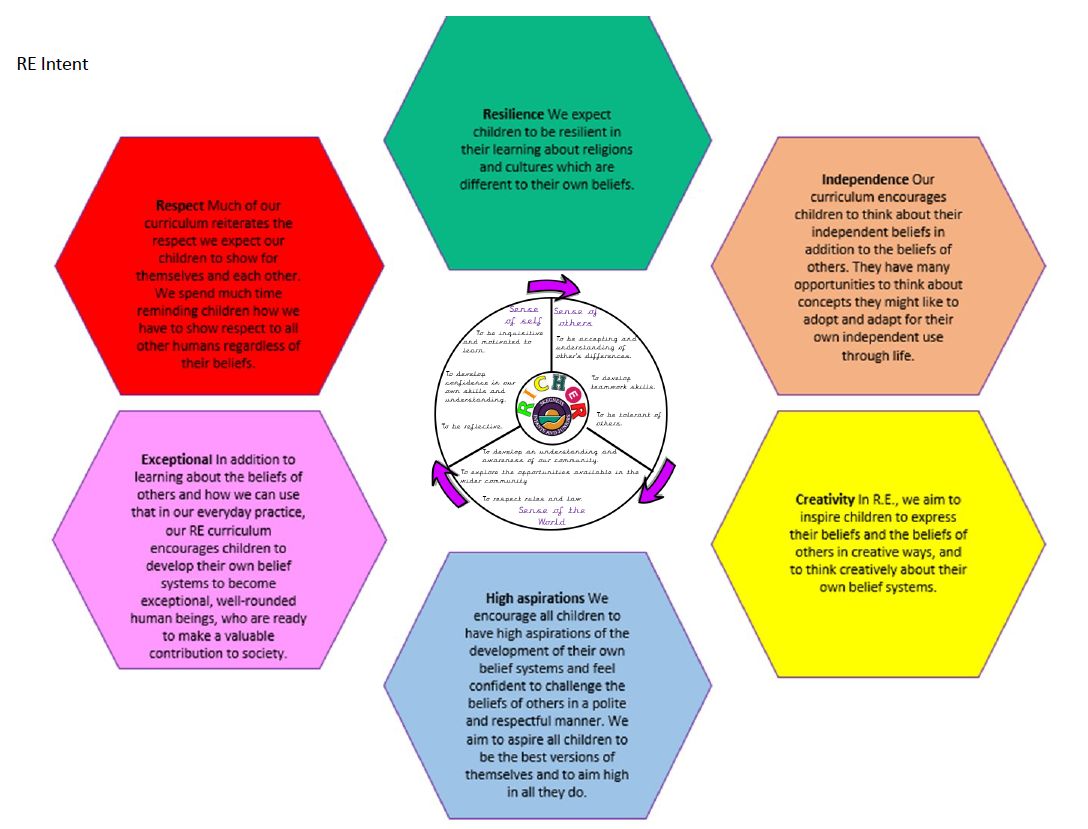Religious Education

Our RE Curriculum
Welcome to the Religious Education (RE) curriculum at Skegness Junior Academy, where our RE curriculum is not only about religious knowledge; it is a gateway to cross-curricular dimensions such as identity, cultural diversity, and community cohesion. We believe that RE plays a crucial role in shaping pupils' personal development and well-being. It is a key contributor to community cohesion by promoting mutual respect and tolerance in our diverse society.
Our RE curriculum extends its impact beyond the confines of the subject, making valuable contributions to other parts of the school curriculum, including citizenship, personal, social, health and economic education (PSHE education), humanities, and education for sustainable development. Through this holistic approach, we provide children with opportunities for personal reflection and spiritual development.
Religious Education is taught to all children unless their parents choose for them to be excluded. Our teaching encompasses several religions and worldviews and the spiritual, moral, social and cultural development of our pupils.
Our teaching enables pupils to acquire knowledge and understanding of religious beliefs, attitudes, practices and rituals of a variety of faiths while developing their own beliefs and values.
Children are also taught that some people have no attachment to religious beliefs and follow secular philosophies.
We follow Religious Education DfE Guidance and the Lincolnshire Locally Agreed Syllabus
Please also visit our Long Term Planning for all year groups in the files section on our main curriculum page.
Principal aim of the Lincolnshire locally agreed RE syllabus
The principal aim of RE in Lincolnshire is to help pupils develop knowledge, insight, skills and understanding about a wide range of religions and worldviews, enabling them to play a full part in a diverse society. Pupils will:
• develop thinking skills which enable them, over time, to navigate an increasingly complex world
• understand how as well as what to learn, through disciplinary and substantive knowledge
• understand that diversity exists between and within religions and worldviews
• know and understand about non-religious and secular perspectives
• reflect upon, and respond to, the ways in which local, national and world events are linked to beliefs, communities, identities, expressions of faith and conflicting interpretations
• understand the impact RWs have on peoples’ lived experiences
The new agreed syllabus is the result of close collaboration with members of Lincolnshire SACRE, primary and secondary school teachers and headteachers, a range of faith communities as well as local and national experts in the field.
Legal Requirements
All maintained schools in England must provide Religious Education (RE) for all registered pupils, including those in the sixth form and reception classes, unless withdrawn by their parents [School Standards and Framework Act, 1998, Schedule 19; Education Act 2002, Section 80]. This requirement does not apply to children below compulsory school age in nursery schools or classes. Each Local Authority (LA) is required to review its locally Agreed Syllabus (LAS) every five years. The teaching of RE is set out in the AS, determined by the LA. The LAS must be consistent with Section 375(3) of the Education Act 1996, School Standards and Framework Act, 1998, Schedule 19 which states that it must ‘reflect that the religious traditions of Great Britain are in the main Christian, whilst taking account of the teaching and practices of the other principal religions represented in Great Britain.’ The law does not define what these principal religions are. RE should be provided for all registered pupils except for those withdrawn at the request of parents/carers [School Standards and framework Act, 1998, Section 71]
Parental Right to Withdraw from Religious Education (RE)
We respect the rights of parents and carers regarding their child’s education. Under current legislation, parents and carers have the right to withdraw their child from all or part of Religious Education (RE) lessons. This includes activities related to Religious Education that do not form part of the statutory National Curriculum.
If you wish to exercise this right, we ask that you inform the school in writing, detailing whether you are withdrawing your child from all or specific parts of the RE curriculum. We are happy to discuss any concerns you may have and provide further information to help you make an informed decision.
